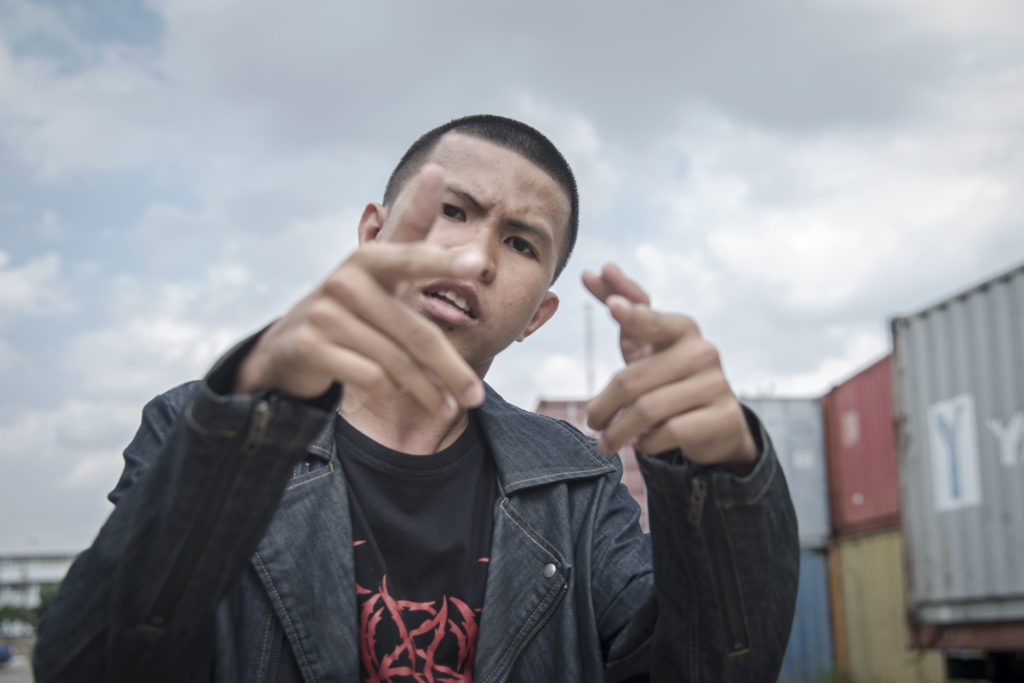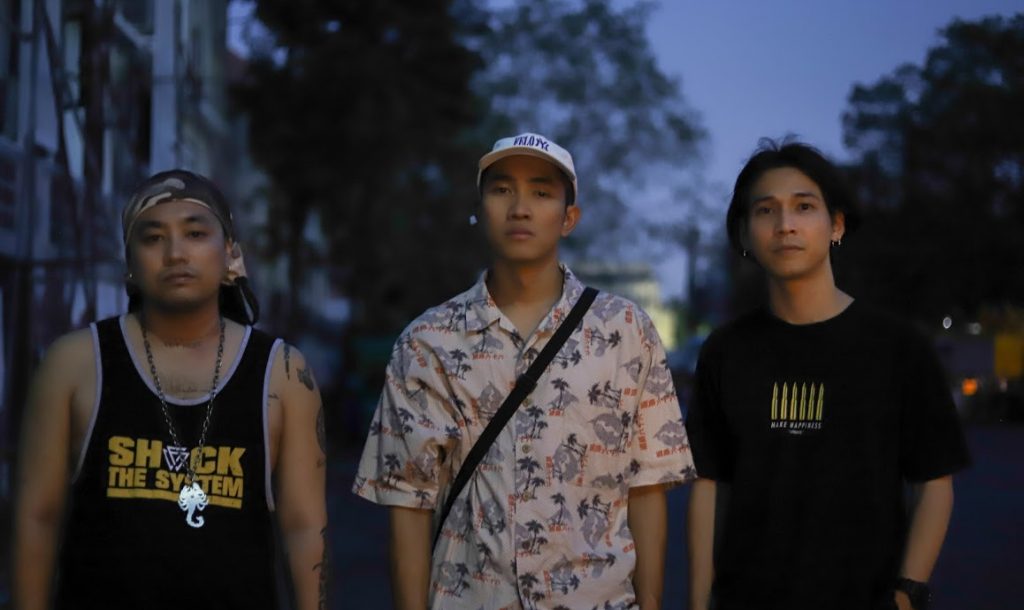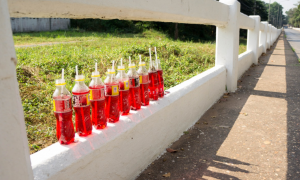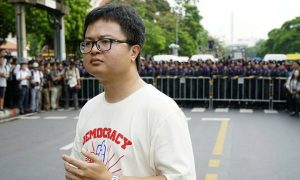The song Prathet Ku Mi (My Country Has) by hip-hop collective Rap Against Dictatorship (RAD) has tapped into a growing sense of anger at the Thai junta, becoming an overnight sensation.
But musical movements don’t happen overnight. Hip-hop first went mainstream in the United States in 1982, when Grandmaster Flash released The Message. However, Flash and others like him—most notably DJ Kool Herc—had been refining their sound at neighbourhood parties in NYC throughout much of the 1970s.
The young rappers who shot to national attention when they released Prathet Ku Mi honed their skills in a vibrant Thai indie rap scene that has been growing bigger in recent years—and growing more political, too.
Below is a sample of songs representing the socially- and politically-conscious side of the scene, taken from 2016–2018. Some of these artists would go on to appear in the Rap Against Dictatorship song.
OC(T)YGEN, Liberate P
The first verse in the Rap Against Dictatorship video is delivered by Liberate P (or Liberate the People), probably the most overtly political of the Thai indie rappers. His track OC(T)YGEN opens with an archive broadcast about the massacre of students at Thammasat University in 1976, setting the scene for lyrics about state violence:
The siren blinks while life is still a struggle fought with two fists, (แสงไฟไซเรนกระพริบชีวิตยังสู้ด้วยสองมือ), his gun is pointing at your head ( ปืนมันเล็งที่หัว), while your brain is still there on the floor (ในขณะที่พื้นยังมีสมองมึง).
Capitalism, Liberate P
In Capitalism, Liberate P raps over a softly-strummed acoustic guitar, reminiscent of a Songs for Life (เพลงเพื่อชีวิต) ballad from the seventies, another era where politics and music shared a stage in Thailand. Songs for Life was a genre of political and left-leaning folk/rock music associated with democratic movements. The band Caravan are often cited as pioneering the style.
Liberate P’s song explores inequality caused by the capitalist system in two verses. The first verse assumes the perspective of a poor person, who complains bitterly that “I have a voice but I don’t have rights” (ฉันมีเสียงเเต่ฉันไม่มีสิทธิ์) and is chastised by others—presumably richer people—for “seeing money as the answer and putting money above the nation” (บอกฉันเห็นเงินเป็นคำตอบ บอกฉันเห็นชอบมากกว่าชาติ).
The second is the voice of a richer person, or perhaps a person with political power, who warns that “If you want to walk, I will put a leash on you. If you want to speak, I will bind fabric over your mouth. If you want to fly, I will chain the country, as if chaining a leg.” (ถ้ามึงอยากเดินกูจะใช้ปลอกมาคอยจูง ถ้ามึงอยากพูดกูจะหยิบผ้ามาคาดปาก ถ้ามึงอยากจะบินกูจะล่ามชาติเหมือนล่ามขา).
Rap Against Dictatorship plans to re-record Capitalism as their upcoming second single.
Section 44, P9d
“Fuck the section 44! 44 rejection!”—P9d uses English in the chorus of this song, making clear his opinion on the law that grants Prime Minister Prayut Chan-o-cha sweeping dictatorial powers. Elsewhere, he criticises the “government of buffaloes” (รัฐบาลควายๆ) for wasting tax money on submarines and planes.
ทุกวันเหมือนเมื่อคืน (Every Day is Like Last Night), G-Bear
At first, G-bear’s abstract lyrics don’t seem political at all. Wandering at night down empty Bangkok streets, the rapper reflects on his life: “Every dream I had, I didn’t reach out to grab the opportunity”, he laments. “Every day is like last night,” he repeats, as if he’s stuck in a rut (ทุกวันเหมือนเมื่อคืน).
But his nocturnal ramblings are interspersed with footage from the 1976 Thammasat University massacre and the occasional barbed rhyme:
I take everything around me to write a song, just like those who grabbed power and wrote their own rules. For how many years have you been fucking up? But you’re still giving excuses? Son of a bitch! To me you’re just a parasite… (ทุกอย่างอยู่รอบตัวกูเอามาสร้างเพลงเหมือนตอนที่ยึดอำนาจแล้วเอามาร่างเอง กี่ปีที่ทำกันพลาดแล้วออกมาอ้างไอ้เวรกูเห็นมึงเป็นพยาธิ…).
G-Bear blurs the lines between the personal and the political, between angst and anger. He appears second to last in the Rap Against Dictatorship video.
ธุรกิจการศึกษา (The Education Business), Chitswift
“What’s happened to Thai schools these days?” (มันเกิดอะไรขึ้น กับโรงเรียนไทยในสมัยนี้) asks Chitswift at the start of his tirade against the Thai education system, which has amassed 24 million videos. His answer? It’s just a business for the powerful to make money (เป็นเพียงธุรกิจที่พวกผู้ใหญ่ใช้เอาไว้หากิน).
Another Chitswift song, แบบอย่าง (Role Model), lambasts the hypocrisy of Thai adults, who he says should set a better example for youth. He mentions the illegal killing of a black panther by Premchai Karnasuta, the president of Italian–Thai Development.
เท่าเทียม (Equality), Elevenfinger
Elevenfinger is a 17-year old from the Rom Klao slum community, near Klong Toey port, who has been using rap to challenge prejudices about the area. In Equality (เท่าเทียม), he decries the standard of education in Thailand, particularly for the less privileged. He lays the blame squarely on the country’s leaders: “Fuck the government who exploit the poor,” he spits in the chorus (Fuck รัฐบาลขูดเลือดคนจน). The video can be viewed here.

พนาไรห์ม (Forest Rhyme), River Rhyme
River Rhyme turn their attention from rivers to forests in this environmentalist track: “Forests should be kept for animals to live and breed in,” they say (ขอพื้นที่ป่าให้สัตว์ได้อยู่และแพร่พันธุ์). Politicians can “go fuck themselves and die” (ส่วนพวกนักการเมืองไล่มันไปตายช่างแม้งมัน). Government officials being granted forest space for holiday homes is a controversial issue in Thailand. The most famous case relates to Chiang Mai’s Mae Rim district, where 200 homes are being built for judges and court officials.
อุดมการณ์ (Ideology), Hockhacker
Some Rap Against Dictatorship fans may have noticed Hockhacker doing a quick wardrobe change to perform two separate verses in My Country Has. In his song Ideology (อุดมการณ์), he gives us an idea about what he wants to achieve with his music:
People ask me why I do what I do (มีคำถามจากสังคมว่าทำไม ทำไม); My only answer is, well, I just do what you would never do (คำตอบมีอย่างเดียวคือทำสิ่งที่มึงไม่ทำไง); Illuminate society, I want to shine a light (จุดไฟให้สังคม เราอยากเป็นแสงสว่าง); Hold up a torch and keep walking forward (จุดมันขึ้นมา แล้วเดินไปข้างหน้า)
Many younger Thais, like the rappers featured here, are increasingly desperate to move forward. And they are increasingly angry at the old guard who are blocking their way. The coups of 2006 and 2014 were elite attempts to reign in a society they feared was changing too fast and slipping out of their control. But you can’t stop progress, you can’t turn back the clock, you can’t oppress forever, and you can’t stop hip-hop.
 Facebook
Facebook  Twitter
Twitter  Soundcloud
Soundcloud  Youtube
Youtube  Rss
Rss 


